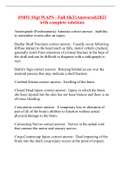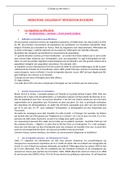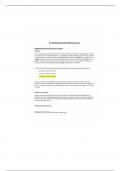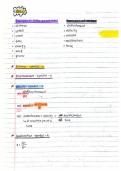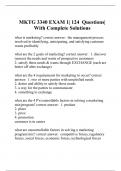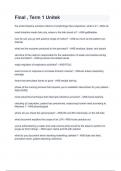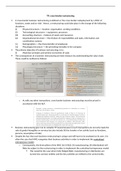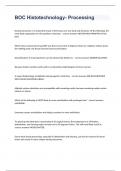One of the central themes of the play is selfishness as JB Priestley questions the morals of
the Birling family and Gerald Croft by highlighting specific examples where each of them
misused their power in a selfish way. The play’s theme of selfishness is particularly
highlighted by the construct of Eva Smith who represents the whole of the working class
population as her last name is “Smith” which was the most common English surname; her
character is a construct to reflect the vulnerable situations that the working class have
enforced on them by the more powerful upper class. Priestley aims to expose the issues
surrounding social inequality and ultimately encourages his audience to vote Labour as their
manifesto in 1945 had very socialist views.
Initially, the theme of selfishness is highlighted by the Birling’s wealth and in turn ignorance
for the rest of society, which is emphasised through the stage direction: “pink and intimate.”
Particularly the adjective “pink” connotes “rose tinted spectacles”, which suggests that the
Birlings are nostalgic, traditional and out of touch with the world. This is further implied when
the inspector arrives as he is suggested to shatter their ignorance; the lighting becomes
“brighter and harder”. This dramatic device is significant as it shows that the Inspector is
shedding light to the family on things they never previously were aware of due to their
ignorance as a result of their greed and selfishness. The adjective “harder” amplifies the idea
that the Inspector is exposing the despondency inflicted on the poor by the Birling family’s
selfish actions. Priestley in particular draws attention to Birling who states that he will always
try for “lower costs” which means lower wages for people like Eva Smith. This highlights the
effects of the capitalist economic system that first set Eva on a downward spiral. Priestley
does this to highlight how there were no legal requirements on pay and that leaving these
decisions up to upper class men like Mr Birling, as a result of their selfishness inflicts
hardship on the working class as even in 1945 many members of the working class could
not afford to pay their bills. Birling further describes himself as a “hard headed man of
business” which suggests that his heart is “hard”, further amplifying his sense of selfishness.
Priestley highlights Birling’s wealth and power as an upper class man to show that he does
have the capability to raise his workers wages and it is something he could afford, to
highlight that when he does not want to raise his workers wages that there is a fault in the
economic system, which the audience know was still apparent in 1945; this encourages the
audience to vote Labour and enforce a fairer socialist economic system. Whilst the war had
meant that there was less social inequality gap as it brought all classes together Priestley
wanted to highlight that the inequality still existed as the upper class still looked down on the
working class even in post-war Britain.
Priestley further highlights faults in the political system as he highlights the issues in the
patriarchal system in that men have more power than women. This is shown through the
character of Eric who was born into money, giving him an economic status which seems to
make him believe that he has a right to Eva’s body as he gets her pregnant and his
immediate excuse is that “I was in a state where a chap easily turns nasty.” He suggests that
he raped her, however his inability to state this implies his shame. The adverb “easily”
highlights his selfish nature as he has come to believe that he can get anything he wants by
right, which is suggested to be afforded by the fact that he is an upper class male. Gender
inequality was a very tense topic in 1912 as it was in the middle of the Suffragette
movement, which was a movement which strived for the right for women to vote. In 1918,
women over 30 won the right to vote and this took another ten years to be extended to
younger women. Priestley links this to the theme of selfishness as Eva is a woman that
became victimised by the selfishness of an upper class male ( Eric) which only made her
more vulnerable in 1912 society as she was an unmarried, working class, pregnant woman;
something that would have been looked down on by the majority of society. This idea is
reinforced by the fact that even Mrs Birling (a woman) looked down on her for it.
Furthermore, it is suggested that the Birling’s selfishness has led to a degree of inhumanity
as Eva is described as a “wretched girl” implying a sense of pity not empathy. Moreover, the
word “girl” is degrading to an adult woman who tragically died. This reinforces the idea that
she was looked down on by the family not only for her class but also for her gender.
the Birling family and Gerald Croft by highlighting specific examples where each of them
misused their power in a selfish way. The play’s theme of selfishness is particularly
highlighted by the construct of Eva Smith who represents the whole of the working class
population as her last name is “Smith” which was the most common English surname; her
character is a construct to reflect the vulnerable situations that the working class have
enforced on them by the more powerful upper class. Priestley aims to expose the issues
surrounding social inequality and ultimately encourages his audience to vote Labour as their
manifesto in 1945 had very socialist views.
Initially, the theme of selfishness is highlighted by the Birling’s wealth and in turn ignorance
for the rest of society, which is emphasised through the stage direction: “pink and intimate.”
Particularly the adjective “pink” connotes “rose tinted spectacles”, which suggests that the
Birlings are nostalgic, traditional and out of touch with the world. This is further implied when
the inspector arrives as he is suggested to shatter their ignorance; the lighting becomes
“brighter and harder”. This dramatic device is significant as it shows that the Inspector is
shedding light to the family on things they never previously were aware of due to their
ignorance as a result of their greed and selfishness. The adjective “harder” amplifies the idea
that the Inspector is exposing the despondency inflicted on the poor by the Birling family’s
selfish actions. Priestley in particular draws attention to Birling who states that he will always
try for “lower costs” which means lower wages for people like Eva Smith. This highlights the
effects of the capitalist economic system that first set Eva on a downward spiral. Priestley
does this to highlight how there were no legal requirements on pay and that leaving these
decisions up to upper class men like Mr Birling, as a result of their selfishness inflicts
hardship on the working class as even in 1945 many members of the working class could
not afford to pay their bills. Birling further describes himself as a “hard headed man of
business” which suggests that his heart is “hard”, further amplifying his sense of selfishness.
Priestley highlights Birling’s wealth and power as an upper class man to show that he does
have the capability to raise his workers wages and it is something he could afford, to
highlight that when he does not want to raise his workers wages that there is a fault in the
economic system, which the audience know was still apparent in 1945; this encourages the
audience to vote Labour and enforce a fairer socialist economic system. Whilst the war had
meant that there was less social inequality gap as it brought all classes together Priestley
wanted to highlight that the inequality still existed as the upper class still looked down on the
working class even in post-war Britain.
Priestley further highlights faults in the political system as he highlights the issues in the
patriarchal system in that men have more power than women. This is shown through the
character of Eric who was born into money, giving him an economic status which seems to
make him believe that he has a right to Eva’s body as he gets her pregnant and his
immediate excuse is that “I was in a state where a chap easily turns nasty.” He suggests that
he raped her, however his inability to state this implies his shame. The adverb “easily”
highlights his selfish nature as he has come to believe that he can get anything he wants by
right, which is suggested to be afforded by the fact that he is an upper class male. Gender
inequality was a very tense topic in 1912 as it was in the middle of the Suffragette
movement, which was a movement which strived for the right for women to vote. In 1918,
women over 30 won the right to vote and this took another ten years to be extended to
younger women. Priestley links this to the theme of selfishness as Eva is a woman that
became victimised by the selfishness of an upper class male ( Eric) which only made her
more vulnerable in 1912 society as she was an unmarried, working class, pregnant woman;
something that would have been looked down on by the majority of society. This idea is
reinforced by the fact that even Mrs Birling (a woman) looked down on her for it.
Furthermore, it is suggested that the Birling’s selfishness has led to a degree of inhumanity
as Eva is described as a “wretched girl” implying a sense of pity not empathy. Moreover, the
word “girl” is degrading to an adult woman who tragically died. This reinforces the idea that
she was looked down on by the family not only for her class but also for her gender.

